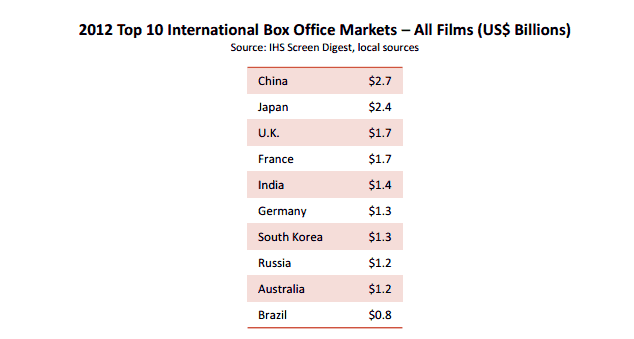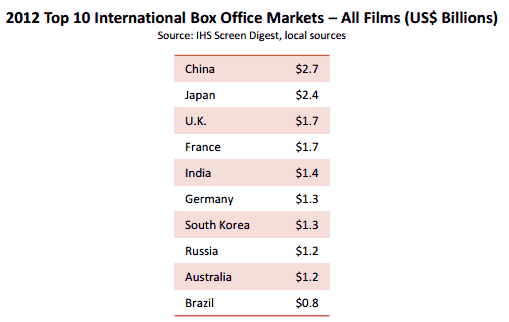Hollywood's Trouble With China? It Has All the Leverage
In its poker game with Hollywood, China is playing with a stacked deck.
The republic, which denied "Despicable Me 2" a release last week and forced Disney to postpone a promotional trip that would have brought Johnny Depp and producer Jerry Bruckheimer to the mainland for "The Lone Ranger," is not afraid to throw its weight around. A year after it loosened restrictions on the number of foreign films it imports, it is giving movie companies a major case of heartburn.
"You have very little control in this marketplace," Ashok Amritaj, chairman and CEO of Hyde Park Entertainment Group, told TheWrap. "You have very little control over what gets approved for co-production status. You have very little control over the weekend that you get to release a film on, because it all depends on what Mandarin Chinese film will be released that weekend. The market is growing in an incredible way, but you have to deal with the protectionism that comes with all of that."
Also read: 'Despicable Me 2' Denied Release in China (Exclusive)
Finding someone trustworthy to guide studios through cultural and political barriers is not easy either.
"Cheating foreigners is almost a national sport in China," Robert Cain, the founder of Pacific Bridge Pictures and a consultant with over 30 years of experience working in China, said. "Nobody will rebuke you in China for doing it, and they will often applaud you, so you have to be careful."
Multiple studios and companies have tried and failed to get their cut of box-office revenue from films that were released months ago, according to an individual familiar with the situation. And they do get it, studios still have to settle for a far smaller slice of the pie on a particular film than they earn in other territories.
Also read: Hollywood Movies Losing Out to Chinese Films in a Big Way
The rental income a studio receives from U.S. theaters, for example, works out to roughly 50 percent of ticket sales -- in China that stands at 22.5 percent after a studio's earnings are subjected to taxes.
A protracted stand-off between studios and Chinese authorities over a value-added tax that cuts into their profits isn't helping matters: As the Wall Street Journal reported earlier this year, 21st Century Fox refused to accept $23 million it was owed from "Life of Pi"s' Chinese release because it insisted the tax being applied to its share of the receipts was too onerous. The studio declined to comment.
To darken the picture even further, new data from China's State Administration of Radio, Film and Television indicates that for the first time in recent history, Hollywood could experience negative growth in the country. During the first six months of the year, films from the United States and other foreign countries accounted for $674.3 million, a 21.3 percent decline from the previous year.
"There's a lot of baggage when it comes to China and a lot of instances of people losing a lot of money," a prominent media executive, who declined to be identified because it could jeopardize relationships with Chinese companies, told TheWrap. "There's hesitancy because everybody in the market has been burned at least once."
See video: Filming in China? Get Used to Doing Business Chinese-Style
Yet studios must maintain their best poker face. China offers both a seemingly inexhaustible source of capital investment and a massive population of moviegoers that studios are desperate to attract.
"The leverage is always on China's side," noted one financier. "In any kind of dealmaking situation or negotiation, it's very tough to operate."
That hasn't stopped companies like DreamWorks Animation, Village Roadshow and Legendary Entertainment from launching co-ventures to produce films aimed at Chinese and global audiences, or IMAX from recently committing to building an additional 35 screens across the county.
While some of those efforts have been well-received, others by like-minded companies have barely made a ripple. They've been announced with great fanfare, but few films or other products have been produced from the unions.
Also read: 3D Still A Hit With Foreign Audiences, But Domestically It's a Different Story
"Very few Hollywood companies have really closed a deal of any substance or generated any real presence there," one financier with ties to China said. "They all shake the tree and there have been plenty of meetings, but there hasn't been a lot of traction."
Stuart Ford, whose sales and distribution company IM Global opened an office in Beijing this summer, said one of the major reasons he was able to break into the market was that his financial backer was the South East Asian media conglomerate Reliance Entertainment.
"Reliance has extensive dealings in China and maintains an on-the-ground presence in Beijing, so that just gave us a huge advantage when it came to navigating the cultural waters," Ford said. "There was a track record that gave us blue chip credibility."
Executives note that any foreign market can be hard to access and that the United States has an ample number of ethically challenged business people who are willing to cheat collaborators. They maintain that any successful venture in China hinges on finding the right partners -- and that can only happen if a company has a deep understanding of the country and its culture.
Also read: China Box Office Will Surpass U.S. by 2020 (Study)
They also caution patience and a willingness to accept that certain American ways of doing business may not translate.
"You have to push hard, but you also have to be flexible," Shane McMahon, the chairman of the Chinese VOD service You On Demand, said. "In the U.S. we are so used to taking a model that is tested and proven and saying, 'OK this model works lets plug it in.' But what works in America may not work in Beijing."
The payoffs for finding the right formula can be enormous. China is building movie theaters at a rate of 10 screens a day, and last year it surpassed Japan to become the second biggest market for movies in the world. It contributed $2.7 billion in box-office revenue in 2012 alone -- a 36 percent jump from the previous year.
"We have seen the emergence of a giant class of consumers unlike any the world has ever seen," Larry Namer, president and CEO of the China-centric media company Metan Development Group, told TheWrap. "When you hear about the number of new screens IMAX opens every single week, how can you be anything but bullish?"
Midway through this year, the Chinese box office has showed no signs of slowing, but the engine of its expansion has been domestic products. The country's box office rose 36.2 percent to roughly $1.7 billion during the first half of the year, with Chinese films responsible for more than 60 percent of those receipts.
At the same time last year, Chinese movies accounted for just 10 percent of the country's market share. Guess who just strengthened its hand at the table?
Related Articles:
TheGrill@ Locations: Filming in China? Get Used to Doing Business Chinese-Style (Video)


